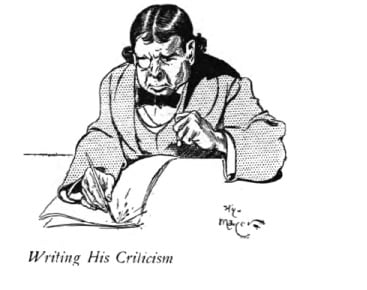 Dear Common Reader,
Dear Common Reader,
The jig is up. My critical stance has been revealed, at last, as mere pose, and it is time that I confess. I owe you so little; still, I owe you that much. So the truth: I disdain you, Common Reader! And what’s more: I feel very entitled to do so.
Or so I learned upon reading William Deresiewicz’s weirdly ad hominem “Seeing Past the Ivy: Do literary mandarins put reading at risk?” The Web-only essay at The Nation is classed in the journalistic DSM-IV as a “Trend Piece”: Deresiewicz is weighing in on what he sees as a recent “frenzy of hand-wringing about the decline of serious reading.” Here he feasts on that frenzy:
Cristina Nehring, writing in the New York Times Book Review, lampooned the self-congratulation she claims the recent reading campaigns have encouraged among book lovers. Spraying allusions to Seneca, Montaigne, Hazlitt and Emerson like so much air freshener, she instructed us that “there are two very different ways to use books. One is to provoke our own judgments, and the other, by far the more common, is to make such conclusions unnecessary.” In an essay on NPR’s Fresh Air, Stanford linguist Geoffrey Nunberg announced that “the people who’ve been lost to novel-reading aren’t the devotees of Dostoyevsky or Faulkner. They’re the people who used to read a couple of romances or thrillers a year”–a conclusion arrived at, no doubt, by telepathy. In any case, “curling up with a good book” is “self-absorbed, escapist and regressive,” whether you’re curling up with “Virginia Woolf or Nero Wolfe.” In a letter to Harper’s, literary critic Wyatt Mason argued that books have always been a minority interest. True enough, but how small a minority? “Like playing competitive tennis at a world-class level or composing polyphonic music in one’s mind, reading a book is… a special way of being alive.” That would put the number of true readers at about a hundred.
When I read that Nehring was “spraying allusions… like so much air freshener,” a fragrant simile if there ever was one, I felt the sinking feeling that overtakes me when any show of learning is dismissed on the grounds that its author can only be showing off. Not having read the Nehring, though, I didn’t dismiss Deresiewicz’s diagnosis out of hand, at least until I got to the end of the paragraph where I’m quoted and shown, at long last, to be a fellow of monumental shortsightedness. For only a silly person could think there are so few true readers; and only a person of high morals and unimpeachable rectitude could conclude, as Deresiewicz does at essay’s end, that I am a “literary mandarin” who “feel[s] entitled to disdain the common reader.”
Let’s do a little literary criticism. Let’s just look at the phrase of mine that Deresiewicz uses to hang me. “Like playing competitive tennis at a world-class level or composing polyphonic music in one’s mind, reading a book is… a special way of being alive.” Deresiewicz suggests that this assertion shows me making a quantitative claim: “That would put the number of true readers at about a hundred.” Is this what my sentence suggests? Actually, it seems I’m making a qualitative point. For to say that reading, as an activity, allows one to achieve as much sublimity and grace as composing did Bach or rallying does Federer is to feel, toward Deresiewicz’s “common reader,” the very opposite of disdain.
Clear enough, even without the sentence’s original context, but all too terribly clear in that context. My letter, after all, was a response to Cynthia Ozick’s essay in this magazine that suggested our culture lacks a critical mass of critics–readers. My letter argued that we actually have a bumper crop of such public readers, an argument I bolstered, quantitatively, here. In other words–and much to my shame after the fact–my letter agrees with Deresiewicz’s larger point: that reading is alive and well. To suggest that I have suggested otherwise suggests that Deresiewicz is a most uncommon reader indeed.





